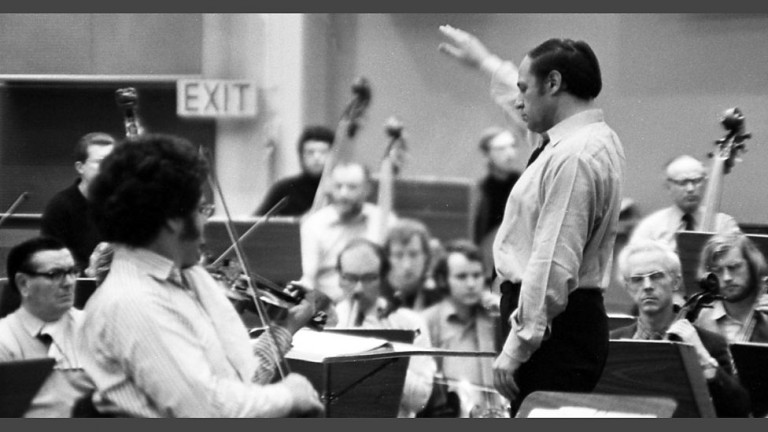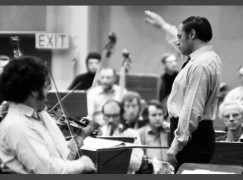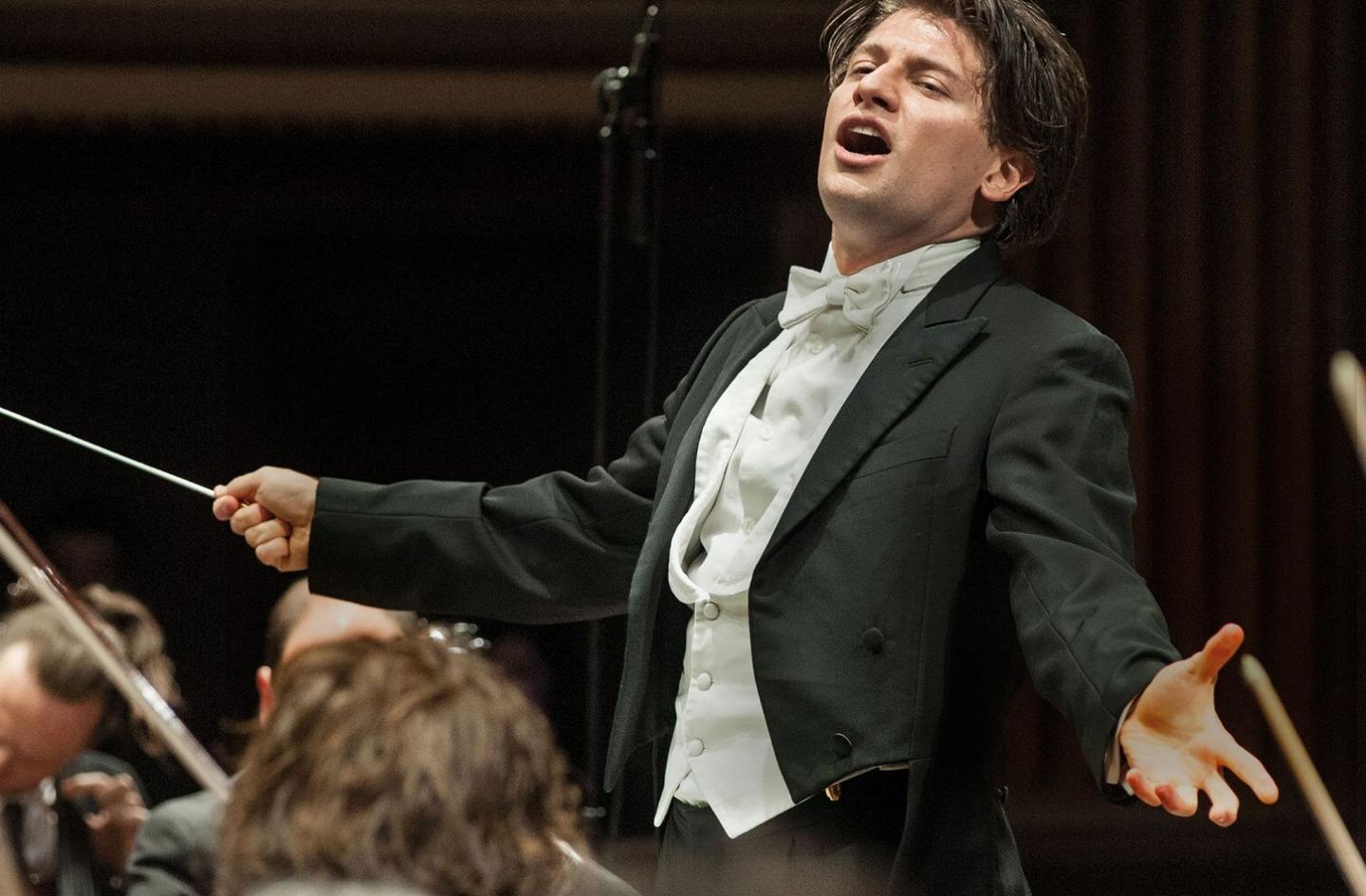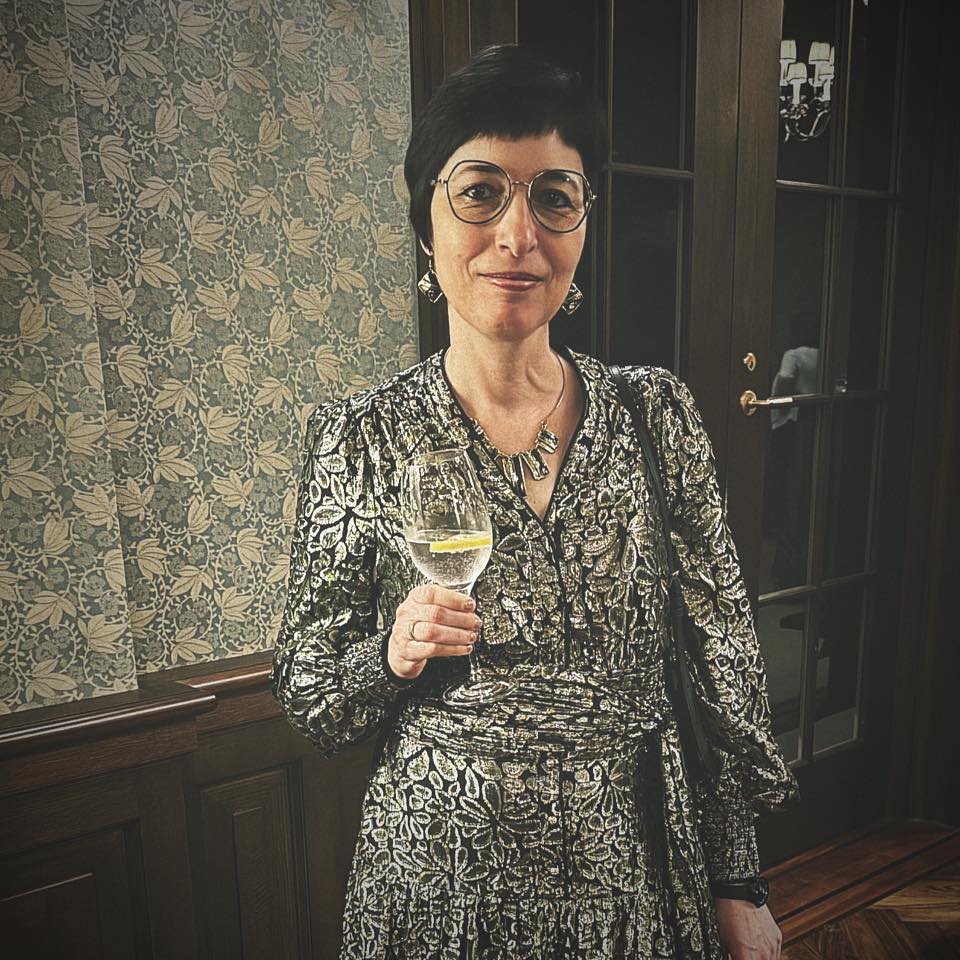Boulez, yelled the timp, that was Abraca-f***ing-tastic
mainA lovely memory of Pierre Boulez by Mary Miller, general and artistic director of Bergen National Opera:

Many years ago, a somewhat posturing editorial appeared in one of the London papers – `Do we really need Pierre Boulez?´ it asked. The response, one imagines, was supposed to reflect England´s early 90s deep-felt and somewhat fashionable wincing in the face of intellectuals, especially those with the gall to talk unflinchingly about elitism and quality. These were the days when cultural political correctness had begun to infest our language with terminology bland as blancmange, and Arts Councils were suggesting that words like talent or gifted were indelicate, nay, dangerous. Boulez, the writer perhaps intended us to cry, was a past sell-by date pedlar of nit-picking musical efficiency with no relevance to 21st century new-age cool or to our retro-reinvented love of goopy instantly emotional tonalism. He wasn´t fun or fast, and worst of all, he was French.
Having the privilege of a Scottish newspaper byline at the time, I responded with red-faced fury. Boulez, I argued, was beyond a game-changer, a musician who had emphatically and indelibly shifted the way we perceive art, a person beyond being merely an influence: an absolute icon of quality and precision and musical excellence whose intellegence, wisdom and passion set down a critical marker in the evolution of European culture.
As a very young violinist in his London orchestra, the BBC Symphony, I had coincided with the final years of his parallel leadership of the New York Philharmonic. I was terrified. He would rehearse Ravel and Debussy desk by desk, hands twitching metronomically, eyes flinty. My desk partner, a very elderly Scot of supreme elegance who had played chamber music in his youth with Heifitz, would whisper ’try a third finger on that top F’ as my damp fingers skidded and skittered. Later, Boulez would summon the whole orchestra and the miracle emerged – long evocative lines which floated and swerved over the immaculate rhythmic scaffolding which his fastidious preparation had created. He made us understand, absolutely, that music is devoid of fluidity – cannot build tension and then let go, cannot sweep and fly – without the discipline of structure.
He had, in the orchestra, huge fans but also grumpy detractors – a noisy ongoing war snarled with the principal trumpet, but he and the eccentric flamboyant Polish principal trombone adored each other – ’Ah Pierre’ Alfred used to splutter tearfully ’true Europe gentleman’. The horn section at the time was spectacular but irracible, tending to erupt at inappropriate times into arrangements of Souza marches if days of Globokar, Maderna or Boulez´s own Explosante Fixe dragged into weeks. Boulez, less than fresh off an overnight flight from New York and a fierce programme of Ligeti would roll his eyes and mutter ’Please, I am in my ninth hour’.
The BBC percussion section was notorious – brilliant as benefitted an orchestra so edgy in its embracing of new work – and full of frightening wit. Rehearsing Bartok, Boulez asked for ’pozzibly…. maybe … a little more magic’ from the timpani at bar 76. We began again. At 76 the drumroll started. ‘Abraca-f***ing-tastic!’ shouted the player.
The tuba player, doomed by history to spend long swathes of time with little to play, was usually immersed in Salinger short stories. At an important concert, he emerged from Franny and Zoe, panicked and came in loudly. And wrong. Abject with apology, he knocked on the conductor´s door at the interval. Boulez appeared clutching a box of Fauchon truffles. ’Never mind’ he said ’have a chocolate…’
Years later I interviewed him before an Edinburgh Festival visit with his Ensemble Intercontemporain. He talked about rhythms in Scottish folk music and mused about scoring in Stravinsky. I asked him why he no longer rigorously conducted the solo bassoon at the opening of Rite of Spring – was it that basson playing was better, or that he had truly relaxed? He giggled and said ’both’.
At his 75th birthday concert he was interviewed on stage, talking with his customary Gallic-inflected fluency. It was hard to reconcile this serene, superb mind with the stormy young dementor of establishments so often described from his 40s – though he smiled about those years without apology. He was asked why he never conducted overtly political music, given his polemnic views – Shostakovich, for example. He replied ’because Shostakovich is a second-rate composer’. The audience squirmed. ’Don´t mistake me’ he said. ’He is an excellent composer, but the evolution of music would not have been altered had he not lived. If we had not experienced Berg and Schoenberg, then our world would be different’.
Only time will tell how badly we have needed Boulez, both his fevered and rebellious youth and his profoundly wise maturity. Maestro, composer, iconoclast, thinker, futurist, friend. Thank you for it all.
(c) Mary Miller/Slipped Disc






[[ Shostakovich is a second-rate composer’. The audience squirmed. ’Don´t mistake me’ he said. ’He is an excellent composer, but the evolution of music would not have been altered had he not lived. If we had not experienced Berg and Schoenberg, then our world would be different’.]]
Bwaaaaaaaaaaaaaaaaahahahahahaha!!!!!
Decades later, Lady Macbeth of Mtsensk is still being played all over the world – it’s being performed somewhere almost every week.
And where is Plink Selon Plunk being played these days?????
I’m not quite sure you understand
He doesn’t, James. He has something against Boulez and feels obliged to make rude and childish comments whenever his name is mentioned. I would ignore Edward, if I were you. Most users here are sick of his inability to sustain any kind of reasonable conversation.
Jihadi John, the forum stalker, strikes once again.
Offtopic offensive ad-hominem garbage, mixed with threats. Nothing about music, ever.
Long overdue that Jihadi John was banned.
As I said, unable to sustain any kind of reasonable conversation.
Time you were banned, mate. Learn to write on topic, or shove off.
Do you think calling people ‘Jihadi John’ is writing on topic? You are laughably hypocritical, Edward.
You should not cry for users to leave when they get the better of you, ‘mate’.
I think we all get it that you don’t like Boulez.
You don’t have to out-Bortslap John Bortslap and comment everytime you see the name “Boulez”.
It’s not connected with whatever I think about Boulez, in fact. It’s my reaction to his writing-off Shostakovich – one of the most seminal composers of the C20th – as a ‘second-rater’ who contributed nothing to music. A truly laughable assessment, springing primarily from professional jealousy.
Boulez said Shostakovich was a fine composer – just that his music didn’t change the course of music history in the way that Stravinsky, Schonberg, Berg, Debussy or Ravel did. That apparently was his criterion for whether a composer was first-rate. And he himself might have called himself second-rate for the same reason (though Boulez’ music, like it or not, probably did influence a lot of composers, not for the better in many persons’ estimation, I imagine).
One is entitled to think he’s wrong about Shostakovich, but it’s not hard to understand Boulez’ point, I would think.
Whether “the world would be different” is often not the measure – many great composers were not innovators. Bach and Mozart come to mind, as the best, loftiest, most wonderful exponents of their styles – but not as revolutionaries…
And what about Brahms? Hardly a revolutionary (in spite of Schoenberg wishing to think so)
Heard a lovely story a few days ago. In his early days with the BBC Symphony, the then concertmaster, Hugh Bean, was chatting to Boulez in a coffee break and asked him where he lived. “Baden-Baden” came the reply. “And you?”, asks the maestro. “Beckenham-Beckenham” came the quick witted response!
Ah, ok, where is the humor?
A lovely piece indeed. Thank you Mary Miller.
The most amusing rebellious musicians are always British: irreverent, rude, obnoxious. Of course they are only rebellious in their interaction with authority figures, they are very conservative in their playing and musical tastes.
Please could we have a web of website monitoring on SD ?
Surely these trolls like Eddie Mars could be edited out ?
The site is losing credibility fast. thanks
Boulez was good with details, compare his Berg three orchestra pieces with Karajan’s. Karajan’s is like one big smudge.
The devil, as they say, is in the detail(s). Listen too Boulez’s marvellous recording of Schoenberg’s Gurrelieder : far superior in my view to those of e.g. Chailly and Rattle, and perhaps not equalled until the recent superb recording by the Guerzenich Orchestra, Cologne, under Markus Stenz.
Among all the posts since PB passed away I’ve yet to read an acknowledgement that his career as a conductor was originally advanced by George Szell. On the surface they seem like the quintessential odd-couple yet Szell brought PB to Cleveland as Principal GC in 1965, included him in his final tour with the CO in 1970 and probably assisted him greatly in being appointed at the NYPO. A cynic might argue that Szell used PB to conduct the repertoire that either no longer or never interested him but the accounts that I’ve read suggest that there was mutual respect for their approaches to music and that Szell greatly respected the way PB interacted with the members of the CO.
Here is the link to the Ckeveland Orchestra tribute to Pierre Boulez. It explains the great admiration the orchestra musicians had for him as a conductor:
http://youtu.be/8nFUixrTKNk
Thank you for posting the link! A longer account of Boulez’s thoughts about conducting the CO can be found on a copy of the 2 disc CD set the orchestra released in 2000 documenting the 1970 tour of Asia. The 2nd disc contains ~ a 30 minute interview with PB. In addition, the live recordings of Szell conducting Weber, Mozart, Sibelius and Berlioz in Japan are essential listening for anyone interested in conductor and orchestra.
A beautiful mémoire – merci, Mary!
An unfriendly article in The Spectator:
http://www.spectator.co.uk/2016/01/spare-us-this-unanimous-chorus-of-praise-for-pierre-boulez/